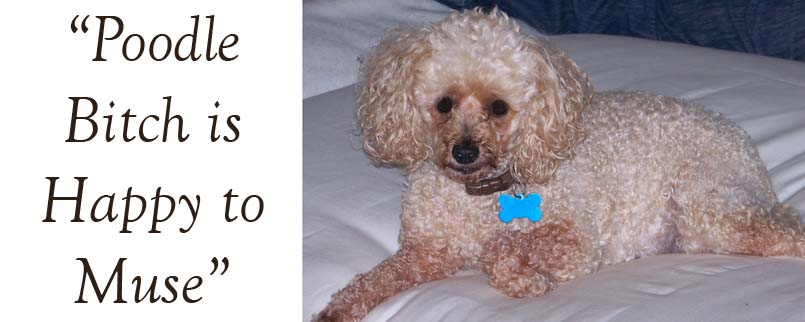"Cannery Row in Monterey in California is a poem, a stink, a grating noise, a quality of light, a tone, a habit, a nostalgia, a dream."
Ah, yes. Cannery Row contains multitudes. Poodle Bitch understands.
That said, Poodle Bitch does enjoy some of his works. Of Mice and Men was a fine book, and Tortilla Flat had some interesting details and genuine humor. And then, there is Travels with Charley.
Naturally, Poodle Bitch enjoys reading about a talented human writer spending time with a bright and cheerful poodle, even if that poodle is standard. Mr. Steinbeck clearly understands the bonds that exist between humans and dogs:
It is my experience that in some areas Charley is more intelligent that I am, but in others he is abysmally ignorant. He can't read, can't drive a car, and has no grasp of mathematics. But in his own field of endeavor, which he is now practicing, the slow, imperial smelling over and anointing on an area, he has no peer. Of course his horizons are limited, but how wide are mine?
And so Poodle Bitch was mildly disturbed to learn that the book Travels with Charley, which she had been given to believe was mostly nonfiction, might in fact be heavily fictionalized.
A huge commercial success from the day it hit bookstands, Travels With Charley in Search of America was touted and marketed as the true account of Steinbeck’s solo journey. It stayed on the New York Times nonfiction bestseller list for a year, and its commercial and cultural tail—like those of Steinbeck’s Of Mice and Men and The Grapes of Wrath—has been long and fat. For five decades Steinbeck scholars and others who should know better have not questioned the book’s honesty. But I had come to realize that the iconic American road book was not only heavily fictionalized; it was something of a fraud.
An author called Bill Steigerwald set out to follow Mr. Steinbeck's original journey with his poodle companion, and cross-checked the claims made in the final printed version against not only a map of the United States, but early drafts of the manuscript, Mr. Steinbeck's letters, and newspaper articles. The results of his research?
The more I learned about Steinbeck’s actual journey, the less it resembled the one he described.
As it turned out, Mr. Steinbeck spent more than half of his journey in the company of not only faithful Charlie, but his own wife. He also spent a great deal of his time in rather tony hotels; hardly roughing it in the wilderness. He also would have had to have traveled at fantastic speeds impossible at the time to have made all of his stops.
Mr. Steinbeck's book was originally published in 1962. In that time, readers and scholars have had ample opportunity to check Mr. Steinbeck's work, and the claims made within. Poodle Bitch wonders why it has taken this long for someone to do so.
She didn't think to do so for herself, because she assumed that experts in the field of 20th century American literature, in particular those who specialize in Mr. Steinbeck's works, would have done so. Poodle Bitch is hardly an expert on his works herself -- she doesn't have enough enthusiasm for him (as she stated above) to delve too deeply into his oeuvre.
Poodle Bitch wonders if that is the problem? The only ones who are examining with deep consideration are those who are the most enthusiastic. The fanboys, to use the modern vernacular. And those people have no interest in suggesting to the public at large that their favored author might have been less than honest in his dealings with the reader.
Then again, perhaps the scholars took it for granted that readers understood Mr. Steinbeck's "dishonesty." As Mr. Steigerwald points out,
Steinbeck dropped hints in Charley that it wasn’t a work of nonfiction. He insisted, a little defensively, that he wasn’t trying to write a travelog or do real journalism. And he pointed out more than once that his trip was subjective and uniquely his, and so was its retelling.
And:
From what I can gather, Steinbeck didn’t fictionalize in the guise of nonfiction because he wanted to mislead readers or grind some political point. He was desperate. He had a book to make up about a failed road trip, and he had taken virtually no notes. The finely drawn characters he created in Charley are believable; it’s just not believable that he met them under anything like the conditions he describes. At crunch time, as he struggled to write Charley, his journalistic failures forced him to be a novelist again. Then his publisher, The Viking Press, marketed the book as nonfiction, and the gullible reviewers of the day—from The New York Times to The Atlantic—bought every word.
So this was a matter of marketing and of a critical establishment that acted more as cheerleaders for a work of art than as genuine, detached examiners.
Poodle Bitch will bear this in mind the next time she laments the fall of modern movie/literary/music criticism. It has always been thus. Perhaps if there had been a "Smoking Gun" website at the time of Travels With Charley's release, the book would not be remembered today. For the sake of the poodle Charley, that would be a shame.
Then again, if James Frey can have his own "fiction factory," for which he is very well compensated, perhaps even the Nobel Prize winning (in 1962 -- the year of Charley's release, Poodle Bitch notes) Mr. Steinbeck could have recovered.



No comments:
Post a Comment